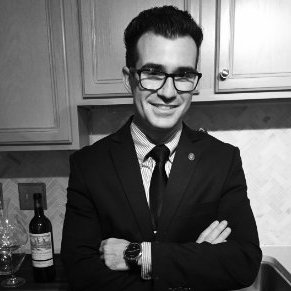Name: Steven Gullo

Nationality: USA-American
At the moment: USA-Pennsylvania
Sommelier & Beverage Director
Prerequisite:
Please, tell us a little bit about your first encounter with wine & the wine industry? Any particular mentors at that time?
My first encounter with the wine industry happened while at the Culinary Institute of America in Hyde Park, NY. I enrolled in several wine courses and immediately fell in love with the whole subject. My mentor at the time was Steven Kolpan, Professor of Wine Studies at CIA.
What specific traits or skills should a Sommelier(e) possess for professional performance and is there any person with that qualities you especially admire within the wine industry?
Communication skills are a must-have for skilled sommeliers. An extensive knowledge of wines is only as good as your ability to deliver that knowledge to all types of diners; novice and connoisseurs alike. Also, an extremely good work ethic is needed to work long hours both in the cellar and on the dining room floor.
What would be your advice to a young Sommelier(e) i.e. Commis Sommelier(e) where to look finding an adequate position at home or abroad? Any further tips?
For young sommeliers: find a restaurant with a serious, extensive wine program and train underneath the head sommelier or beverage director. Be willing to work in positions such as food runner or server and learn along the way. In the meantime, studying for exams and obtaining certifications will greatly improve your credentials and build your resume.
Active:
When a customer asks for advice on selecting wine what’s in your opinion would be the best approach?
The best approach for suggesting wines to a guest is to find out their flavor preferences. First, I always ask which grape varieties/regions they are interested in. Then I get more specific by asking if they prefer fuller/riper, or more subtle, softer versions. I also list specific flavor descriptors. Do you like dried cherries vs fresh cranberries, etc.? I never directly ask the guest for a price range. I start suggesting mid-range bottles ($60-$80), then use best judgement to determine if they would like to spend a higher price.
What’s your philosophy about glasses? Are you working with well known brands or are you considering new brands as well and how do you determine?
I’ve worked with Schott Zwiesel and Riedel. Both are fine brands that are meant for serious wine drinking. Regardless of brand, a restaurant should strive to use the proper size and shape stemware for different wine styles. (i.e. Burgundy glass vs. Bordeaux glass vs. White wine glass).
What advice would you give people on pairing wine with food?
When pairing wines with food, I assess a dish in the same manner as a wine; by determining the dominant flavor. Is the dish earthy? fruity? herbaceous? Always take into account sauces and cooking method. The role they play in the flavor of the dish often determines the pairing.
Wine list:
What are the key ingredients for creating a wine list for a restaurant and what is your opinion on some ridiculous pricing on wine in restaurants, do you have tips on how to determine markup?
The most important thing to consider when composing a wine list is to maintain balance. There should be a wide enough variety of styles and price ranges to appeal to your clientele’s different tastes. There should also be a fair mix of familiar labels and more obscure, esoteric wines. Ultimately, the wine list should be concise and reflect the creativity of the sommelier, and still match the Chef’s cuisine and cooking style.
In my opinion, markups should be done on a “diminishing scale” The higher the cost, the lower the markup. Hence, a bottle that costs $20 will be marked up 3x whereas a bottle that costs $50 will be marked up 2x. To me, its a more common practice for a restaurant to use higher markups on cheaper bottles. But, when restaurants are using high markups on high cost wines, they are abusing their guests. A patron shouldn’t be paying $200 for a $50 bottle at cost.
How do you manage to stay on top of the changes in the wine industry?
I stay current with changes in the wine industry through intense research. Reading articles and texts on a daily basis is necessary for an extensive knowledge on wines. Meeting often with vendors and attending trade tastings is equally important.
How would a new vineyard get the attention of someone like you to notice their wine and what’s the best way for producers to improve their chances of being listed?
A new winery would get my attention by having a presence in my region. Distributors should have an incentive to advertise new wineries, and sell them at a fair quality/price ratio. New wineries should also try be featured in as many trade events as possible as to increase their exposure.
Favourite pick:
If you were a wine, which variety would you be, and why?
If I were a wine, I would be Riesling. Lively, energetic, & improves greatly with age.
What are the top 3 types of wine (your faves) would we find in your home wine collection and what’s your desert island wine?
My favorite three wines currently are White Burgundy, Southern Rhone’s, and all reds from Piedmont.
Most wines in my collection are Napa Cabernet and Meritage blends. I also have a fair amount of Champagne and dessert wines like Tokaji and Sauternes.
My desert island wine would have to be Blanc de Blancs Champagne.
My best suggestions for magazine and websites are guildsomm.com, decanter.com, Wine & Spirits magazine, and winecellarinsider.com.
Steven Gullo
@ by Dominik Kozlik – Zeitgeist Sommeliers – International Sommelier Positions – www.sommelier-jobs.com

Dominik Kozlik e.U.
78/12 Gruberstr.
4020 Linz, Austria